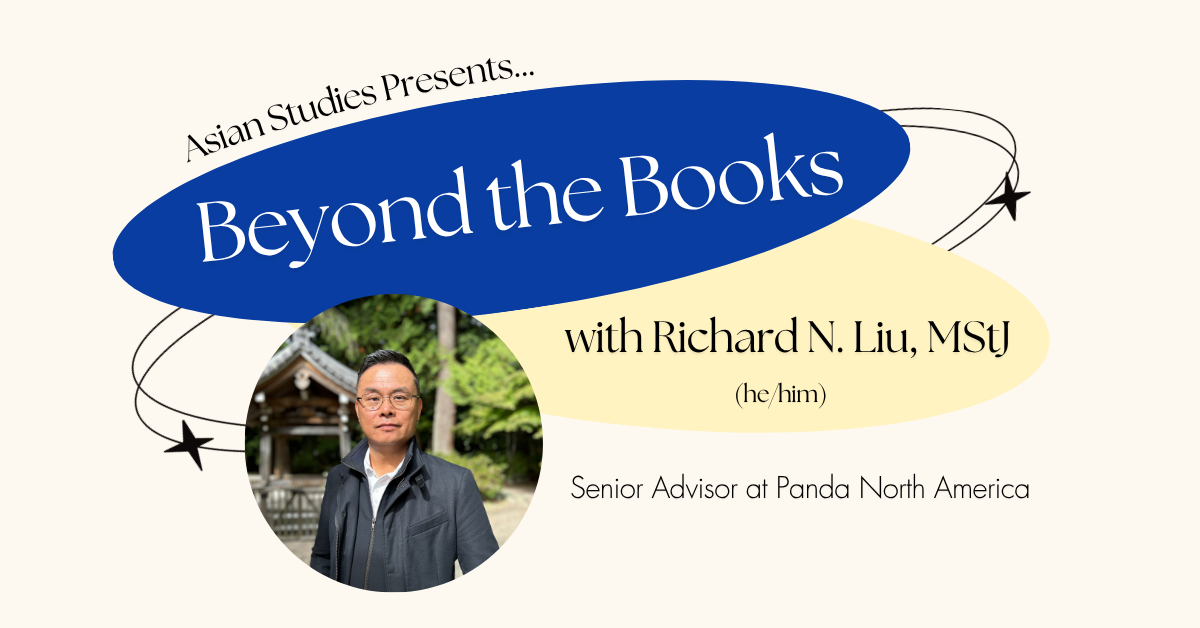Interested in what you can do with a degree in Asian Studies? In our Spotlight Interview Series, we ask our students, postdocs and alumni about their career paths, how they became interested in Asian Studies and for any advice they would give to current students. In this interview, recent graduate Meng Zhang enlightens us on a lesser-researched Chinese goddess, Zigu, and the unusual household item she is a deity of, and shares her best advice for graduate students.

Tell us a little about yourself, your background and how you became interested in Asian languages and cultures?
I grew up in Beijing and finished my undergraduate study at Zhejiang University in China. After getting a bachelor’s degree in Chinese Studies, I came to UBC to pursue further study. Tracing the origin of my interest in Chinese studies, it is just happenstance. My mother was preparing for a certificate when I was in grade 1 and grade 2. To better take care of me, she took me to the library with her every weekend. So, starting from reading the book that my mother chose for me, to immersing myself into the sea of books, I found myself addicted to reading. That was the start of the whole story. I then chose Chinese Studies as my major, and now, I am here.
Could you elaborate on an experience that you felt was fundamental in your study of Asian culture?
As graduate students, writing is what we are doing every day or at least what we eventually have to do. To produce high-quality output, I think reading, as an input, is particularly important. Of course, research-related reading is undoubtedly fundamental for our study and/or research. But casual reading is also essential. Reading sources/books that are not quite related to our study may consume a certain amount of time, but we can take a break from study and gain some fresh thoughts from casual reading as a trade-off.
Could you explain to a non-expert what you are researching and why it is significant?
My research mainly focuses on the evolution of and the changes in a Chinese goddess, Zigu, who was regarded as one of the latrine (a.k.a. toilet) deities in pre-modern China. As the latrine goddess, Zigu was commonly worshipped by women before the Song dynasty (960-1279) and was widely invited by literati later on. My research aims to unpack the evolution of Zigu belief from the fifth century to the fifteenth century from multiple aspects, with a specific focus on the gender factor. From a modern perspective, the latrine might be a symbol of pollution and filth, but it is an inevitable part of our daily lives. The study of the latrine deity Zigu should have aroused scholars’ attention, but surprisingly, has not been well-researched.
How did UBC help you achieve your goals?
I think this two-year-study at UBC not only equips me with extensive knowledge but also helps me improve my mental strength. More importantly, UBC helps me gradually have a clear self-cognition of my career. I used to feel lost because what comes with this major is not only the open possibilities but also some uncertainties. Thanks to UBC, studying in this multicultural community and communicating with Asian Studies’ peers help me set up an optimistic and open mindset towards new challenges and an uncertain future. The various possibilities and uncertainties still exist, but I am well-prepared to confront them.
Has there been an aspect of your graduate experience that was unexpected?
Under the shadow of this pandemic, it is hard to say there is something more unexpected. However, looking on the bright side, as a side effect of COVID-19, I have some unexpected tranquil time of solitude for contemplation and reflection, which is helpful for my life.
Can you give any advice to new students in our program or for students considering applying to it?
As a new graduate, I do not think I am wise enough to give advice. But I would like to share some thoughts with new students:
First, it is a cliché – cherishing whatever you confront. It is hard to be successful in your study or satisfied with your research all the time. Sometimes, obstacles and frustration are unexpected and inevitable. When you are under the shadow of frustration, you might feel extremely helpless. But after you get out of the gloomy mood and eventually overcome the problems, you will realize the obstacles you are confronted with are what help you improve.
Second, do not think you are studying a useless major if later you are having a hard time looking for a decent job. Education is never wasted. Remember what brought you here and what kind of future you want to have. If you have a life dream to pursue, then just go for it. If not, then enjoy exploring the various open possibilities brought by this major!


